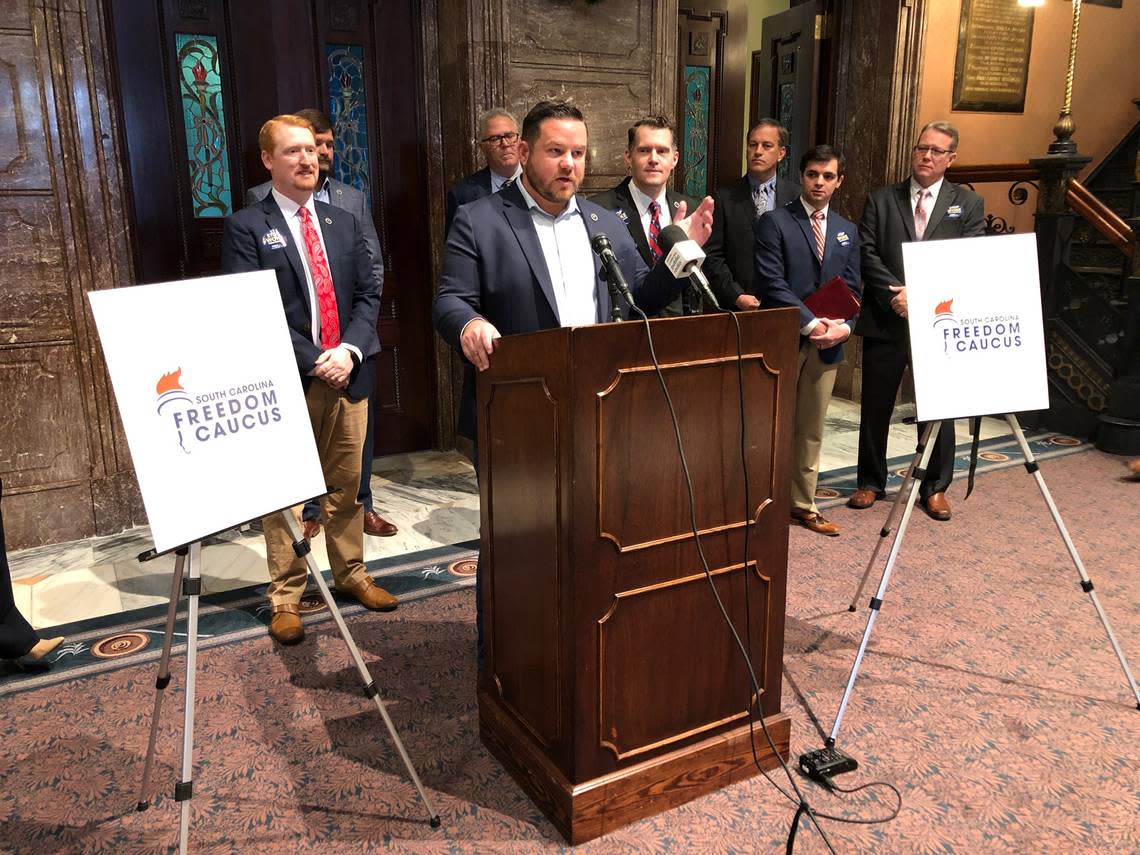What is the SC Freedom Caucus supporting the abortion death penalty bill? 5 things to know

Women who get abortions in South Carolina could face the death penalty under a bill supported heavily by the House Freedom Caucus.
What exactly is this group of legislators?
The S.C. House bill, the South Carolina Pre-Natal Equal Protection Act, if it became law, would potentially make abortion punishable like murders — with sentences of 30 years in prison up to the death penalty. However, the bill does make an exemption for a woman who has an abortion if “she was compelled to do so by the threat of imminent death or great bodily injury.”
The bill was first sponsored by State Rep. Rob Harris, R-Spartanburg, who is a member of the South Carolina Freedom Caucus in the House. But he is far from the only member of this ultra-conservative Republican group to support the bill.
Here are five things to know about the Freedom Caucus.
The Freedom Caucus is young
The South Carolina Freedom Caucus is relatively young, formed in April of last year. It’s one of several similar state caucuses formed through the State Freedom Caucus Network, which itself only began in 2021 with the support of the U.S. House Freedom Caucus. The network is run by Republican strategist Andy Roth and Justin Ouimette, the former House Freedom Caucus executive director.
The network has launched caucuses in 10 states to date. The South Carolina version has promised to fight against excessive state spending, push for socially conservative proposals and take on both Democrats and Republicans who they believe don’t fully support their ideals.
Who is in the Freedom Caucus?
There are 20 state House members listed as part of the South Carolina Freedom Caucus. Of those, most have added their names to the South Carolina Pre-Natal Equal Protection Act since it was first introduced. Below is the names of the legislators listed as members of the caucus. The legislators who have an ’S’ after their names are those who have been added as sponsors to the bill.
Rep. Adam Morgan, chairman — Greenville
Rep. RJ May, vice chairman — Lexington
Rep. Josiah Magnuson — Spartanburg: S
Rep. Thomas Beach — Pickens: S
Rep. Mike Burns — Greenville: S
Rep. Bill Chumley — Spartanburg: S
Rep. Bobby Cox — Greenville
Rep. April Cromer — Anderson: S
Rep. Patrick Haddon — Greenville
Rep. Rob Harris — Spartanburg: S
Rep. Stewart Jones — Laurens: S
Rep. Jay Kilmartin — Lexington: S
Rep. Steven Long — Spartanburg: S
Rep. Ryan McCabe — Lexington: S
Rep. Alan Morgan — Greenville
Rep. David O-Neil — York: S
Rep. Melissa Oremus — Aiken
Rep. Jordan Pace — Berkeley: S
Rep. Ashley Trantham — Greenville: S
Rep. Joe White — Newberry: S
The Caucus has sued other Republicans
The Freedom Caucus filed a federal lawsuit House Ethics Committee members — Republicans and Democrats — over free speech grounds in February. The caucus wants the court to let it solicit donations and get involved in campaigns, much like the two main party caucuses in the lower chamber.
State ethics law currently permits the Republican, Democratic, Legislative Black Caucus and Women’s caucuses to raise money and opening advocate for candidates. Other caucuses like the military caucus, family caucus and freshman caucuses, are forbidden from such privileges.
Many other Republicans not fans of the Caucus
Most of the Republicans in the 124-member House have been unamused by the Freedom Caucus’ tactics, which have included photographing the public voting board, showing constituents how their Republican representatives have been voting. Infighting between the caucus and other Republicans began when the main House Republican Caucus required other members to sign a list of rules, such as agreeing not to campaign against other members. The majority of the Freedom Caucus refused to sign.
MUSC ended transgender hormonal care after Caucus criticism
The Freedom Caucus claimed victory in December after the Medical University of South Carolina confirmed it no longer was providing pediatric hormonal therapy. The caucus had filed a Freedom of Information Act request to get records on the hospital’s pediatric endocrinology unit. The group had claimed MUSC was engaged in “child abuse” for providing hormonal therapy at the clinic.
MUSC stated it had stopped providing transgender hormonal care six months prior, after legislators attached a measure to the state budget, which banned the hospital from offering gender transition care to anyone under 16 years old. The hospital never provided therapy to children under 10 years old, MUSC states.

